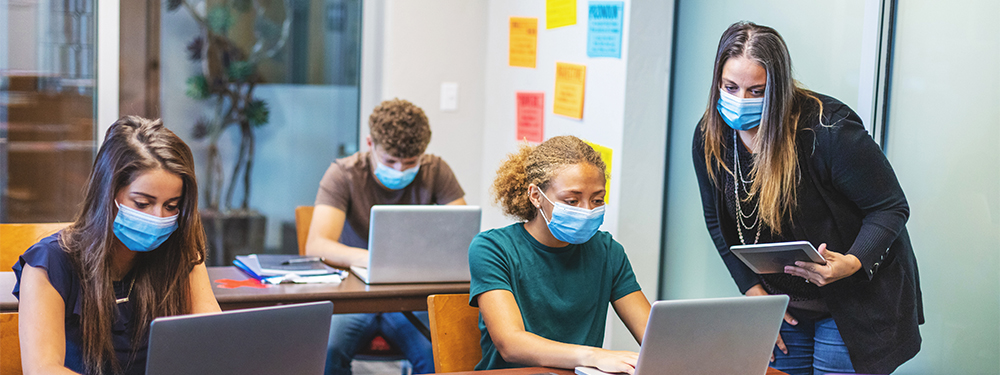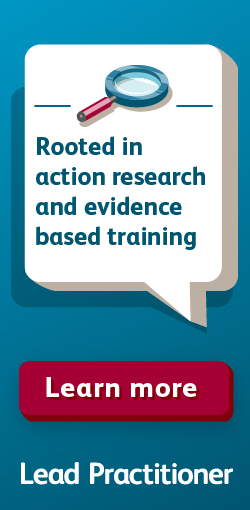
Gemma Williamson, Deputy Principal for Teaching and Learning at The Hazeley Academy, explains why it’s essential that we are ambitious when considering how face-to-face learning might be transformed post-COVID-19
The theme of ‘catching up’ following the recent period of remote learning is high on the agenda for both schools and the Department for Education and is pervasive in the education press. However, is ‘catching up’ on lost time really enough? Surely, we should be more ambitious for our young people? Students have been learning in new and innovative ways, and we have an opportunity to capitalise on it.
The language of this perceived deficit is toxic, and we should handle it with care. Phrases such as ‘lost generation’, ‘behind’ and ‘lost learning’ negate the phenomenal achievements of students, parents and teachers throughout lockdown. When looking ahead, we must use the new skills, knowledge and relationships we have forged.
The future of education will be characterised by flexibility: flexibility of when, where and how students learn. This has far-reaching implications for the structure of our education system. Large, multi-class lessons online that support staff workload are great CPD, but this can also be strengthened by great, personalised learning. Intervention, revision and collaborative project work can be facilitated with ease online, demonstrating economies of scale, and strengthening education in the home. This also extends to relationships with parents, enjoying closer communication and mutual understanding of the reality and context of the learning.
Teachers could focus more in lessons on addressing misconceptions
This leads us to consider how face-to-face learning might be transformed in the future. We have learnt that some areas of the curriculum can be effectively delivered online: extended reading, pre-learning and low stakes testing all seem to work well in this environment. This could potentially be freeing, giving time and space in face-to-face lessons. Teachers could focus more in lessons on addressing misconceptions, encouraging deep-thinking and facilitating discussion – all markers of excellent learning.
Lev Vygotsky asserts that learning is rooted in relationships and discussion. Talking in the classroom is central to developing deep thinking. More collaborative project work linked to the real world will become easier and yet more valuable for the future. The grim vision of education where students are blindly plugged into the web for hours is redundant as more emphasis can now be placed on communication, relationships, collaboration, innovation and entrepreneurship.
We have a duty to continue to develop the skills our young people have learnt
When considering the shape of learning ahead, it’s essential to consider how the Covid-19 pandemic has transformed how students learn. It may be that knowledge gaps in student learning during the pandemic are not as significant as the gaps in social and emotional development. We have a duty to continue to develop the skills our young people have learnt: resilience, flexibility, independence and interdependence. Students can do more and achieve more than ever thought possible. We have an opportunity to redesign our curriculum to incorporate what seemed unrealistically utopian at times: self-directed learning, flipped learning, and deep, personalised engagement.
We now have ‘powerful levers to boost learning’, so metacognition must be a high priority. While a knowledge-rich curriculum is clearly important, project-based learning could be more global, innovative and collaborative. Lessons and schemes of learning could encourage students to be more independent, using the high-quality resources out there, eg Oak National Academy and BBC Bitesize. Students need to learn how to become excellent online learners by using information and sources judiciously and making active use of online content and seeking support.
We have a rare chance to transform education as schools begin to return to ‘normal’
The schools in 5 Dimensions Trust (Shenley Brook End School and The Hazeley Academy) are currently exploring how the pandemic experience provides an opportunity to reshape learning in the future. Our current provision and plans include the following examples:
- Reducing the face-to-face contact time and introducing timetabled online learning (including “live” lessons)
- Increased time for staff professional development and planning, including online
- Online project-based provision for able and ambitious students
- Online “EDTalks” with experts from around the globe
- Collaborative teaching for small cohort subjects across the trust or partnership (eg further maths)
- More effective use of online tools such as data-analysis (Power BI) and assessment (Forms) to personalise and inform teaching
- Connective learning projects with local business and stakeholders as our students shape the future of their local communities.
We have a rare chance to transform education as schools begin to return to ‘normal’. I don’t think I can return to where we were before the Covid-19 pandemic. I am a different teacher, and my students are more capable learners. The question is: are we are brave enough to move away from the safe model of the Victorian schoolroom? Let’s hope so….
References
Lev Vygotsky’s Sociocultural Theory via Simply Psychology
Collins, K. Sir; Metacognition and Self-Regulated Learning via Education Endowment Foundation



Louise McGonagle on said:
So accurate and much food for thought. A brilliant article!